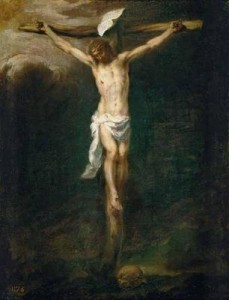
There Is a Fountain Filled with Blood (Chapter Nine)
The soul who sins shall die (Ezekiel 18:20 ESV).
For the wages of sin is death, but the free gift of God is eternal life in Christ Jesus our Lord. (Rom 6:23 ESV).
For our sake he made him to be sin who knew no sin, so that in him we might become the righteousness of God (2 Cor 5:21 ESV).
The biggest problem to experiencing personal revival is sin, individual and corporate. My sin and your sin grieve the Holy Spirit and prevent him from blessing our lives and our ministry efforts on his behalf. Our relationship with God remains in tact, but our fellowship with each person of the blessed Trinity suffers. In chapter ten of The Calvary Road, Roy Hession explains the simplicity of “walking in the Spirit” (Gal. 5:25) and maintaining on-going fellowship with God:
The message and challenge of Revival, which is coming to many of us these days, is searching in its utter simplicity. It is simply that there is only one thing in the world that can hinder the Christian’s walking in victorious fellowship with God and his being filled with the Holy Spirit – and that is sin in one form or another (pg. 97).
We all sin and we know that our behavior disappoints God and hurts others. I am wrong because I have broken God’s law; my selfish actions have wounded God’s heart and hurt others. Sin turns the world upside down: it says that everyone and everything should revolve around my desires, needs, and wants. My sin is rebellion toward God and unbelief in his plans and purposes. Sin came into the world through Adam’s fall and continues through my willful rebellion and unbelief.
I have failed as a Christian so what do I do? I try harder. No, I look to the same grace that saved me to forgive me. I must remember that I am accepted by God not based my personal performance, but based on Christ’s infinitely beautiful performance on the Cross. “But if we walk in the light, as he is in the light, we have fellowship with one another, and the blood of Jesus his Son cleanses us from all sin (1 John 1:7-8 ESV). I run to the blood of Christ to find forgiveness, cleansing, and renewal.
There is only one thing in the world that can cleanse him from sin with all that that means of liberty and victory – and that is the power of the Blood of the Lord Jesus. It is, however, most important for us that we should see what it is that gives the Blood of Christ its mighty power with God on behalf of men, for then we shall understand the conditions on which its full power may be experienced in our lives (pg. 97).
The blood of Christ is clear confirmation that Christ died a sacrificial death to pay for our release from the captivity of sin and bondage to Satan’s schemes. In other words, we owe our salvation to the death of Christ. His blood removes our guilt before God (1 Pet.1:18-19), cleanses ours stricken consciences (Heb. 9:14), gives us bold access to the Father (Heb. 10:19), on-going cleansing from our sin (1 John 1:7) and conquers all of Satan’s accusations (Rev. 12:10-11). We sinned, the penalty of our sin is death, Christ took our place, and died so that we might live. Jesus’ blood condemns death and in that death, the penalty of our sin was paid in full. In short, the blood of Jesus is the virtue of his death for our sins. That virtue continues to flow even after we become Christians.
How many achievements and how many blessings for men the Scripture ascribes to the power of the Blood of the Lord Jesus! By the power of His Blood peace is made between man and God (Col 1:20). By its power there is forgiveness of sins and eternal life for all who put their faith in the Lord Jesus (Col 1:14; John 6:54). By the power of His Blood Satan is overcome (Rev 12:11). By its power there is continual cleansing from all sin for us (1 John 1:7). By the power of His Blood we may be set free from the tyranny of an evil conscience to serve the living God (Heb 9:14). By its infinite power with God the most unworthy have liberty to enter the Holy of Holies of God’s presence and live there all the day (Heb 10:19) (pg. 98).
How do we experience the full power of the blood of Christ in our lives? Repentance. Repentance is simple, but not easy. It is a change of mind and heart which affects my attitude and alters my conduct. Repentance is not turning inward, but turning around. It is the recognition that God is right and that I am wrong. Repentance renews my fellowship with the Lord that was lost through sin. Repentance opens the door to the forgiveness that was already bought for me on the Cross. Repentance is not trying to get God to forgive, but receiving the forgiveness that Christ released two thousand years ago on Calvary’s hill. That forgiveness, that blood, that joy is flowing, always flowing from Golgotha.
There is a fountain filled with blood
Drawn from Immanuel’s veins;
And sinners, plunged beneath that flood,
Lose all their guilty stains.
Forgiveness is not getting even: it is giving away the right to get even. We have committed grave injustices in the world. In fact, we have acted in such a way that we place ourselves above all others. By our behavior, attitudes, and actions we have turned the world upside down by making ourselves the center of attention instead of God and his glory. When God forgives us, he chooses to forget all the wrongs that we have done to him and all damage that we have done to others. Because of Christ’s awesome and bloody sacrifice, God himself gives away the right to get even with us. Forgiveness is always found in the blood of Christ.
Lord, teach us to run to the foot of the Cross that there we might repent and receive the forgiveness bought for us by the blood of the Lamb.





